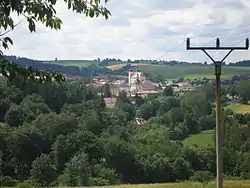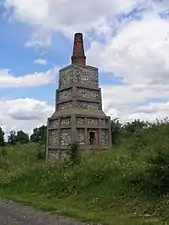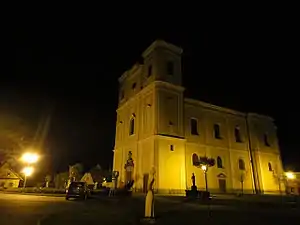Bystré (Svitavy District)
Bystré (Czech pronunciation: [ˈbɪstrɛː]; German: Bistrau) is a town in the Svitavy District in the Pardubice Region of the Czech Republic. It has about 1,500 inhabitants. It lies approximately 12 kilometres (7 miles) south east from Polička.
Bystré | |
|---|---|
Town | |
 Bystré as seen from Hartmanice | |
 Flag  Coat of arms | |
 Bystré Location in the Czech Republic | |
| Coordinates: 49°37′42″N 16°20′49″E | |
| Country | |
| Region | Pardubice |
| District | Svitavy |
| First mentioned | 1200 |
| Area | |
| • Total | 14.09 km2 (5.44 sq mi) |
| Elevation | 604 m (1,982 ft) |
| Population (2020-01-01[1]) | |
| • Total | 1,515 |
| • Density | 110/km2 (280/sq mi) |
| Time zone | UTC+1 (CET) |
| • Summer (DST) | UTC+2 (CEST) |
| Postal code | 569 92 |
| Website | www |
Administrative parts
Village of Hamry is an administrative part of Bystré.
History
The first written mention about the town dates back to year 1200. The Czech Chronicle by Wenceslaus Hajek (which cannot be taken as a credible source though) mentions a village which in 1021 should have been situated in place called U kostelíčka (about one kilometer to the west from the present town). The name of the town is derived from Bystrý, a stream flowing through the town. After the original settlement was burnt out, a new market village Bystré was built up on the Trstenice trail (mentioned in 1349). The village was shaped as a horseshoe and the first owner of the village Bystré were the Lords of Mokošín. Since 1213 the village belonged to Svojanov manor. Bystré received the town right during the reign of Charles IV. In the later period the city gained a number of privileges, such as toll collection right and the right for a weekly market. Jan Bezdružický z Kolovrat became the town owner in the 16th century. Under his rule, a local fort was constructed. Jan died in 1604 and was buried in a tomb in the local church. The following owners, lords of Martinice, started mining of iron ore in Hamry (currently a part of the municipality of Bystré). During the Thirty Years' War the city was devastated. In 1624 Albrecht von Wallenstein passed through the town. Leopold of Valderode bought the manor of Bystré in 1686. In 1707 the manor was sold again, this time in an auction. The new owner (Jakub Hanibal, the count of Hohenems) let built the town hall. During the rule of his son, Franz Rudolph, the construction of a new church started and spa Balda was founded in the neighborhood. As the counts of Hohenems died out in 1869, Bystré manor was passed to Emperor Franz Joseph I who owned it until the establishment of Czechoslovakia in 1918.
Symbols
- Coat of arms
A legend says that in the period when Bystré formed a part of Svojanov manor the tax revenues from Bystré and surrounding villages were taken away to Svojanov. The money was carried by a collector – most probably by one of the town councilors. Once, the collector was attacked by a bear during his journey through the forest between Hartmanice and Svojanov. The collector succeeded to kill the bear with a spear. This event became the symbol of the town, being depicted on the coat of arms and the city seal.
- Flag
The flag has dark red background with two wavy stripes – a black and a golden one. These stripes symbolize two streams (Zlatý and Bysterský) between which Bystré was founded. The flag was introduced in 1998.
In popular culture
Vojtěch Jasný's movie All My Compatriots was in 1968 filmed in Bystré and its surroundings. Also the filming of a stand-alone sequel Návrat ztraceného ráje partially took place in Bystré in 1999.
Gallery
 Statue of John of Nepomuk
Statue of John of Nepomuk Old lime kilm
Old lime kilm Saint John the Baptist Church
Saint John the Baptist Church A view at Bystré
A view at Bystré
References
- "Population of Municipalities – 1 January 2020". Czech Statistical Office. 2020-04-30.
- Strategický plán rozvoje města Bystré 2017–2020 (in Czech), Město Bystré, p. 14
External links
 Media related to Bystré (Svitavy District) at Wikimedia Commons
Media related to Bystré (Svitavy District) at Wikimedia Commons- Official website